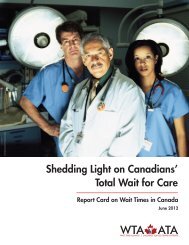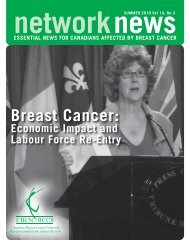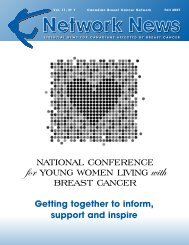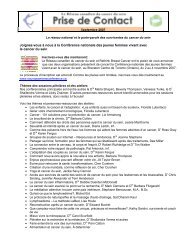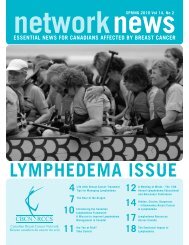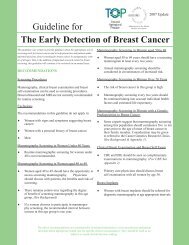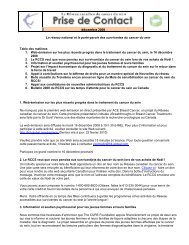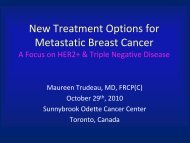Network News - Winter/Spring 2010 - Canadian Breast Cancer ...
Network News - Winter/Spring 2010 - Canadian Breast Cancer ...
Network News - Winter/Spring 2010 - Canadian Breast Cancer ...
You also want an ePaper? Increase the reach of your titles
YUMPU automatically turns print PDFs into web optimized ePapers that Google loves.
• Women who test positive for<br />
the BRCA2 mutation also have a<br />
50-85% lifetime chance of getting<br />
breast cancer and a 10-20% lifetime<br />
risk of ovarian cancer<br />
• Those with the BRCA1 or BRCA2<br />
mutation have a 50% chance of<br />
passing the mutation on to each of<br />
their children<br />
• Both men and women<br />
can have a BRCA1 or<br />
BRCA2 mutation, and<br />
these mutations can be<br />
inherited from one’s<br />
mother or father<br />
• BRCA1 and BRCA2<br />
mutations also<br />
increase prostate<br />
cancer risks among<br />
men, and in particular<br />
mutations in the<br />
BRCA2 gene also<br />
increase the risks for<br />
pancreatic cancer,<br />
melanoma, and male<br />
breast cancer<br />
• BRCA mutations occur<br />
in individuals of all<br />
ethnic backgrounds,<br />
but are more common<br />
in certain populations. About 1 in<br />
50 Ashkenazi Jews has a BRCA1<br />
or BRCA2 mutation that increases<br />
the risks for breast, ovarian and<br />
related cancers. French <strong>Canadian</strong>s<br />
of certain ancestry may be at<br />
increased risk. There are common<br />
BRCA mutations in the Icelandic<br />
and Dutch populations<br />
• Although they are at increased risk,<br />
not all people with BRCA1 or BRCA2<br />
mutations will develop cancer<br />
According to the genetic counsellors,<br />
people are often unaware that women<br />
with inherited ovarian cancer are at<br />
increased risk for breast cancer while<br />
those with inherited breast cancer are<br />
at higher risk for ovarian cancer.<br />
While the statistics can be daunting,<br />
Armel believes that genetic counsellors<br />
can be of great assistance as “tour guides<br />
that lead people down a path and help<br />
them decide what is right for them.”<br />
There is an education component, which<br />
involves helping the patient understand<br />
genetic testing and reaching a decision<br />
about whether or not to be tested.<br />
Genetic counselling can also encompass<br />
trying to sort out inconclusive test<br />
results, or helping a person come to<br />
terms with a positive result and then<br />
developing a plan of action.<br />
What can a woman do if she tests<br />
positive for a BRCA mutation and is at<br />
increased risk of developing cancer?<br />
Susan Armel (Left) and Rochelle Demsky (Right)<br />
For ovarian cancer: Regular<br />
monitoring (pelvic or transvaginal<br />
ultrasound and a CA125 blood test);<br />
oral contraceptives (birth control pill);<br />
prophylactic oophorectomy (surgical<br />
removal of ovaries and fallopian<br />
tubes); and hysterectomy (removal of<br />
the uterus).<br />
For breast cancer: Screening (breast<br />
self-exams, clinical breast exams,<br />
mammograms and MRIs); medications<br />
such as Tamoxifen; prophylactic<br />
oophorectomy (surgical removal<br />
of ovaries and fallopian tubes); or<br />
prophylactic mastectomy (surgical<br />
removal of the breasts).<br />
Genetic counselling and testing are<br />
concentrated in major <strong>Canadian</strong> centres.<br />
Some provinces and territories access<br />
these services through other provinces.<br />
Patients from smaller communities<br />
and rural or remote regions may avoid<br />
significant travel by accessing genetic<br />
counsellors via Telehealth Ontario. If a<br />
person decides to proceed with testing<br />
after counselling, a blood sample can be<br />
taken by local health professionals and<br />
sent in for analysis.<br />
Some of the newer trends in genetic<br />
counselling involve group sessions for<br />
the teaching component, followed by<br />
individual sessions with each patient.<br />
Depending on the patient’s wishes,<br />
some centres will provide test results<br />
by phone, followed by<br />
an in-person meeting<br />
with their counsellor to<br />
explore options.<br />
Armel and Demsky<br />
can envision the day<br />
when genetic testing<br />
is routinely used to<br />
help determine a<br />
course of treatment for<br />
those diagnosed with<br />
hereditary breast or<br />
ovarian cancer.<br />
In the meantime,<br />
while acknowledging<br />
the challenges of the<br />
job, they say genetic<br />
counselling offers<br />
many rewards. Says<br />
Armel: “Although testing isn’t right for<br />
everybody, we feel that we are helping<br />
prevent cancer and I think our patients<br />
see it that way too.”<br />
For more information, please visit:<br />
Hereditary <strong>Breast</strong> and Ovarian<br />
<strong>Cancer</strong> Foundation<br />
www.hboc.ca<br />
Hereditary <strong>Breast</strong> and Ovarian<br />
<strong>Cancer</strong> Society<br />
www.hbocsociety.org<br />
FORCE: Facing Our Risk of <strong>Cancer</strong><br />
Empowered<br />
www.facingourrisk.org<br />
Willow <strong>Breast</strong> <strong>Cancer</strong> Support<br />
Canada<br />
Visit www.willow.org or call<br />
1-888-778-3100<br />
To find a genetic counsellor, contact<br />
your family physician as a first point<br />
of reference; also refer to the <strong>Canadian</strong><br />
Association of Genetic Counsellors at<br />
www.cagc-accg.ca . •<br />
20 <strong>Network</strong> <strong>News</strong> <strong>Winter</strong>/<strong>Spring</strong> <strong>2010</strong>



